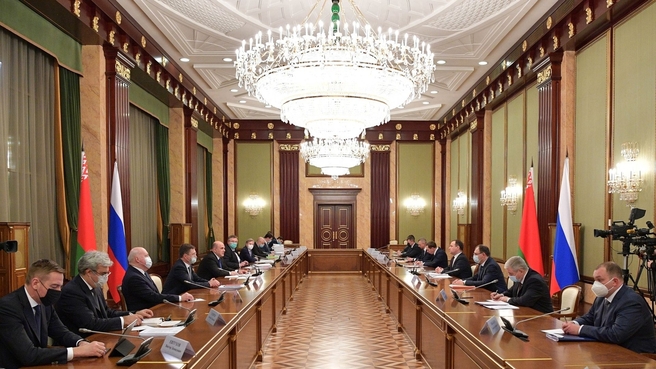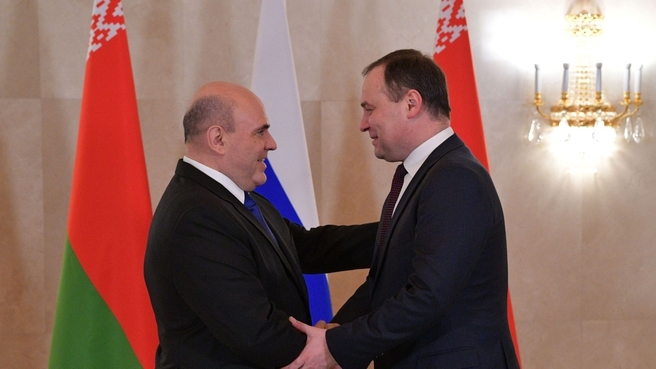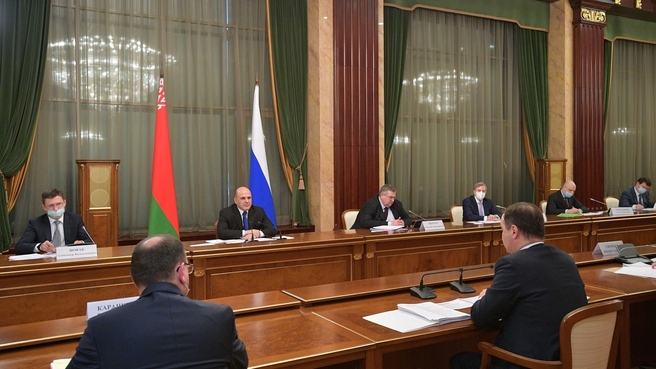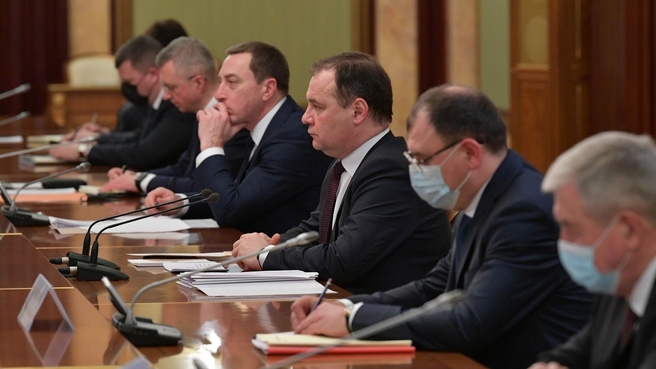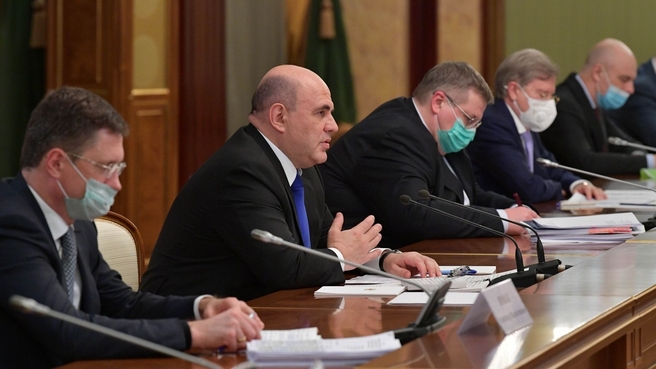Mikhail Mishustin held talks with Prime Minister of the Republic of Belarus Roman Golovchenko.
Excerpts from the transcript:
Mikhail Mishustin: Mr Golovchenko, colleagues, guests. I am delighted to welcome all of you to the Government of the Russian Federation. This is our first meeting in 2021, and I would like to wholeheartedly wish you all the very best in the new year.
We greatly value our fraternal relations with Belarus. Our people share a common history and they are bound together with strong spiritual and cultural ties. Of course, we are interested in advancing our cooperation to a higher level and giving a new substance to our integration efforts in the Union State.
Overall, our trade and economic cooperation has been developing successfully. In 2019, before the COVID-19 pandemic began, our trade exceeded $35.5 billion. It is with good reason that Belarus ranks first among our economic partners throughout the Commonwealth of Independent States. Naturally, the coronavirus pandemic has had an impact on the general situation, including in trade, but I would not describe this impact as considerable. Our trade decreased only slightly. Our common objective is to relaunch the growth of trade this year and to overcome all the negative consequences of the coronavirus pandemic, which have affected our economies one way or another.
Importantly, Russia holds top place when it comes to accumulated investment in Belarus; it exceeded $4 billion in 2020. There are some 2,400 companies with Russian capital in Belarus. When Mr Golovchenko and I were preparing for this meeting, we spoke on numerous occasions about the importance of building up our interaction, creating as many joint ventures as possible and encouraging Belarusian and Russian businesses and entrepreneurs to join projects in our common space.
Relations between Russia and Belarus are absolutely unique. Their main underlying feature is the many-years long industrial ties. There are joint value chains and mutual supplies of components in a number of industries. I would like to mention major joint projects in the automobile industry, agriculture, forestry equipment and chemical products. It is vital to create as comfortable conditions for our businesses as possible and, of course, to launch new collaborative projects.
I would like to once again congratulate all of us on the launch of the Russian-built first reactor of the Belarusian Nuclear Power Plant, which attained design capacity on 12 January. This unique project is to be implemented for many decades, and I hope that it will open up new cooperation opportunities in the high-tech sphere.
I also want to highlight our joint measures to combat the COVID-19 pandemic. On 4 January, we delivered another batch of test kits for diagnosing the coronavirus infection. Under a decision by President of the Russian Federation Vladimir Putin and President of Belarus Alexander Lukashenko, a joint facility for the production of the coronavirus vaccine is being set up in Belarus.
In addition to economic cooperation matters, we traditionally prioritise our cultural and humanitarian ties, mostly cooperation in education, science and culture. Last year, we accomplished a great deal in this field. I believe that we should also study opportunities for joint events, visits by our scientists, teachers and actors throughout 2021. I hope we will discuss all of this today in detail.
Mr Golovchenko, you have the floor.
Roman Golovchenko: Thank you, Mr Mishustin.
Mr Mishustin, members of the Government of the Russian Federation, members of the Government of the Republic of Belarus.
Indeed, this is our first visit to the Russian Federation this year. And it is quite natural, because Russia is our closest partner and ally, and we have a very extensive and positive agenda for the talks, and we sincerely appreciate your kind invitation and the way you so promptly organised this meeting of high-ranking participants.
We have regular contacts with your side; last year, we even lost count of the times we met at different venues and discussed various topics. This is how it should be in the Union State where we have many common challenges and a rich agenda for cooperation.
You very correctly noted the positive trends in our trade and economic collaboration, despite all the difficulties. Russia is traditionally our country’s largest trade and economic partner, and accounted for 44 percent of Belarus’s foreign trade in goods and services over the 11 months of 2020 we evaluated. We really do hope that with December, the figures will be even higher and Russia’s share will probably approach 50 percent.
We have not seen any critical decline in mutual trade despite the difficulties you mentioned, with COVID, although we have indeed lost about 20 percent of the total. This year, I think there is every prerequisite in place for overcoming this recession. The situation is fully manageable. We have significant reserves in industry, agriculture, and construction, and I believe direct contacts aimed at achieving results in the current conditions are a priority for both governments and, accordingly, agencies and business entities of our states.
The development of cooperation at the regional level is also very important. Last year, we started a fairly intensive series of mutual visits and exchanges. Heads of the Russian regions, governors accompanied by high-ranking delegations visited the Republic of Belarus attending packed business programmes. Return visits have already begun, and those are nothing like tourist trips. I have seen important documents signed as a result of those exchanges, and plans and programmes adopted. Those were substantive meetings filled with very specific content, something that must be supported in every possible way, as was decided at the 7th Forum of Russian and Belarusian Regions, which took place in Minsk last autumn. It is obvious to all unbiased observers that thanks to the ongoing constructive interaction between the heads of state, between the two governments, we are resolving all matters in an absolutely constructive spirit, and not only current issues, which abound, but also those of a system-wide nature.
If we focus on milestone events of 2020, we can note the following. As I mentioned earlier, we managed to maintain the key trade variables despite external shocks. You have correctly noted the successful launch of the Belarusian Nuclear Power Plant which is the largest integration project of the decade based on terms that are favourable to both sides. You were right when you said that work is underway on the first power unit, and the second power unit will be launched later. Builders and nuclear scientists still have a lot of work to do.
System-wide agreements have been signed regarding the involvement of industrial products in federal and municipal procurement. Most of the issues related to the admission of Belarusian agricultural products to the Russian market have been resolved. Good cooperation has been established in the sphere of product labelling and traceability. A presidential executive order has been issued quite recently, into which the Belarusian government has put a lot of effort. Thus, Belarus is almost ready and is now participating in the joint traceability and labelling chains for individual goods, which will be followed by other product groups. This is important if we want to jointly protect our common market from substandard and counterfeit products.
A project to track freight in transit with the use of electronic navigation seals, also an element of this system, is being successfully implemented.
We signed an agreement on mutual recognition of visas, which had been in the making for a fairly long time. This is important to ensure the mobility and transit of foreign nationals within our common space.
Mr Mishustin, there are a number of urgent tasks, which we will address this year. Among them is the search for system-wide solutions for common energy markets in the Union State and the EAEU. It is also about regulating systemic issues concerning product access to the common market. We believe, we should have long since tackled a critical question, which has dropped out of our sight a little, that is the notion of the Union State’s goods, products, or services. I think we will discuss this issue in a little more detail later. This also includes the improvement of systems and technology to ensure product traceability and market transparency. I believe that, building on last year’s constructive spirit, we will direct this process into a systematic channel, including thanks to the departments’ ongoing energetic efforts on the integration agenda which includes the main areas of implementing the provisions of the treaty on creating the Union State, on which I also suggest comparing notes today.
I am pleased to know that our experts are not chasing formalities, catchy or high-flown terms. We believe we must carefully figure out from the get-go, as they say, what these issues are all about, in essence, not so much form, and identify areas where our economic interests overlap. If we harmonise them, it will give us a positive synergistic effect. We must direct and adjust this process.
Our delegation is ready for the discussion. The agenda proposed by Belarus is not extensive, but concrete.
